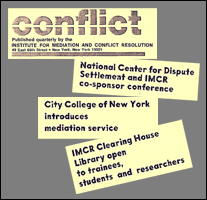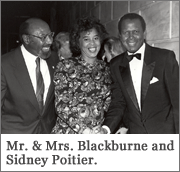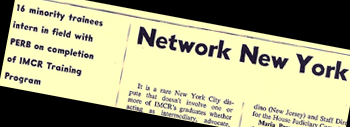The promise of mediation stems from the way that mediation constantly integrates feedback. A mediator in a session will listen to one of the parties and reframe what they thought they heard, soliciting the party's response as a tool to strengthen the quality of the exchange. IMCR as a Community Dispute Resolution Center has always balanced the practice of mediation with a strong commitment to training mediators. One reinforces the other. Ideas generated in the field are used to train mediators who then, often through their volunteer work, bring those practices to helping resolve conflicts in their communities. The relationship is symbiotic and on going.
 What makes the story of IMCR distinctive is the breadth and scale of training programs that have originated under the agency's auspices. Even beyond the 14,000 individuals trained in mediation and conflict resolution since 1969, IMCR has long been one of the pioneers in developing dispute resolution methodologies tailored for the needs of organizations and institutions. In the field of education, IMCR helped design the conflict resolution curriculum for John Jay College of Criminal Justice, Long Island University's Graduate Program in Political Science, City College, Columbia Law School, St. John's University of Massachusetts and the Institute of Politics at Harvard. A list of institutional clients would include the Residential Tenancy Commission in Toronto, Canada, the Renewal Program in London, England, the Iowa State Judicial Planning Commission, the Houston Bar Association and the Neighborhood Justice Center Committee also in Houston, Texas. During the years in which IMCR was on the forefront of judicial reform, as a result of IMCR's development and implementation of a grievance systems to facilitate the management of internal conflicts in New York State's correctional institutes, the agency helped California, Colorado, Ohio, South Carolina and Virginia create similar systems for their correctional facilities.
What makes the story of IMCR distinctive is the breadth and scale of training programs that have originated under the agency's auspices. Even beyond the 14,000 individuals trained in mediation and conflict resolution since 1969, IMCR has long been one of the pioneers in developing dispute resolution methodologies tailored for the needs of organizations and institutions. In the field of education, IMCR helped design the conflict resolution curriculum for John Jay College of Criminal Justice, Long Island University's Graduate Program in Political Science, City College, Columbia Law School, St. John's University of Massachusetts and the Institute of Politics at Harvard. A list of institutional clients would include the Residential Tenancy Commission in Toronto, Canada, the Renewal Program in London, England, the Iowa State Judicial Planning Commission, the Houston Bar Association and the Neighborhood Justice Center Committee also in Houston, Texas. During the years in which IMCR was on the forefront of judicial reform, as a result of IMCR's development and implementation of a grievance systems to facilitate the management of internal conflicts in New York State's correctional institutes, the agency helped California, Colorado, Ohio, South Carolina and Virginia create similar systems for their correctional facilities.
 Because of the prominence of its Board of Directors and its ground breaking work fostering community dialog in the wake of racial and cultural confrontations in and around New York City, IMCR earned a national reputation early in its history. The agency responded to the explosive interest in alternate forms of dispute resolution by sponsoring conferences with organizations like the National Center for Dispute Settlement; by presenting seminars and creating fellowship programs (with City College); and by embarking on ambitious training programs for the New York State Public Employment Relations Board and the U.S. Department of Justice's Community Relations Board. . Since IMCR evolved in response to the needs of urban communities, it was only natural that the applicability of its techniques and methodologies resonated in the public sector, where organizations were struggling to improve internal and external communication in the face of increased diversity. In New York State alone, IMCR provided technical assistance and training in conflict resolution to the Board of Education, the Board of Higher Education, the Commission on Human Rights, the Human Resources Administration, the Housing Authority, the Health and Hospital Corporation, New York State Mental Health and Affirmative Officers from a variety of state agencies. IMCR was asked to provide training seminars on managing culturally diverse work forces to New York City's top 40 managers and when NYC decided to create Community Board Liaisons, they had IMCR train over 400 government officials and civic leaders from the NYC Personnel and City Planning departments.
Because of the prominence of its Board of Directors and its ground breaking work fostering community dialog in the wake of racial and cultural confrontations in and around New York City, IMCR earned a national reputation early in its history. The agency responded to the explosive interest in alternate forms of dispute resolution by sponsoring conferences with organizations like the National Center for Dispute Settlement; by presenting seminars and creating fellowship programs (with City College); and by embarking on ambitious training programs for the New York State Public Employment Relations Board and the U.S. Department of Justice's Community Relations Board. . Since IMCR evolved in response to the needs of urban communities, it was only natural that the applicability of its techniques and methodologies resonated in the public sector, where organizations were struggling to improve internal and external communication in the face of increased diversity. In New York State alone, IMCR provided technical assistance and training in conflict resolution to the Board of Education, the Board of Higher Education, the Commission on Human Rights, the Human Resources Administration, the Housing Authority, the Health and Hospital Corporation, New York State Mental Health and Affirmative Officers from a variety of state agencies. IMCR was asked to provide training seminars on managing culturally diverse work forces to New York City's top 40 managers and when NYC decided to create Community Board Liaisons, they had IMCR train over 400 government officials and civic leaders from the NYC Personnel and City Planning departments.
IMCR is one of the very few Community Dispute Resolutions Centers with international stature. In 1989 the Institute President led a 35 person delegation of lawyers, judges, mediators and arbitrators to the People's Republic of China for a three week professional and cultural exchange. The Institute has responded to training and technical assistance requests in countries from Malaysia to England, from Kenya and South Africa to Nicaragua. This year we are looking forward to training mediators in Ecuador. IMCR has always stressed the importance of multi-cultural diversity and is extremely proud that it is a bilingual community dispute resolution center.
 Those familiar with IMCR's history know that beginning in the mid-70's, the Institute moved from being solely focused on community relations to an expanding role in judicial reform. This change allowed the agency to develop training programs to benefit organizations involved in the administration of justice, from the policemen and women on the street to the procedures of summons Court and on through to the management of correctional facilities. In addition to the development of grievance systems cited above, IMCR implemented conflict resolution training programs for precinct commanders, officers of the Community Affairs Division and academy staff of the New York City Police Department. From 1977 to 1981 IMCR trained personnel with the Victim Services Agency (VSA) as part of the first effort to involve mediation in the handling of felony cases. Outside of New York State, IMCR provided training to the California Youth Authority, the US Department of Justice, the Boston Urban Court Program and the Family Violence Programs in Cleveland, Dorchester, Kansas City, Honolulu and the city of Bromley in England.
Those familiar with IMCR's history know that beginning in the mid-70's, the Institute moved from being solely focused on community relations to an expanding role in judicial reform. This change allowed the agency to develop training programs to benefit organizations involved in the administration of justice, from the policemen and women on the street to the procedures of summons Court and on through to the management of correctional facilities. In addition to the development of grievance systems cited above, IMCR implemented conflict resolution training programs for precinct commanders, officers of the Community Affairs Division and academy staff of the New York City Police Department. From 1977 to 1981 IMCR trained personnel with the Victim Services Agency (VSA) as part of the first effort to involve mediation in the handling of felony cases. Outside of New York State, IMCR provided training to the California Youth Authority, the US Department of Justice, the Boston Urban Court Program and the Family Violence Programs in Cleveland, Dorchester, Kansas City, Honolulu and the city of Bromley in England.
Regardless of the venue or the association, for 32 years IMCR has consistently offered individuals and organizations state of the art training in an effort to promote peaceful human relations through mediation and conflict resolution services that empower individuals to respond constructively to conflict.
At present, the tradition continues with IMCR conducting mediation training sessions at its main office in the Bronx; Mercy College, and international sessions in Central and South America. - Training.